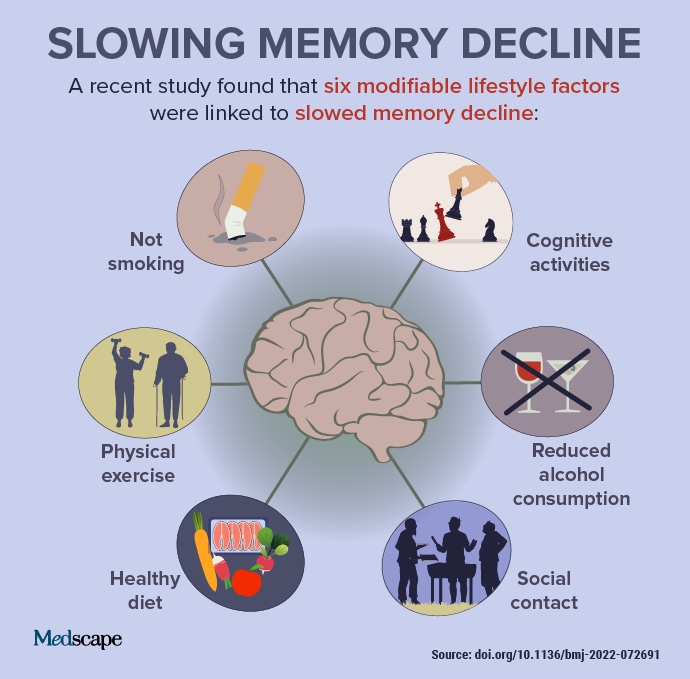Trending Clinical Topic: Slowing Memory Decline
Each week, we identify one top search term, speculate about what caused its popularity, and provide an infographic on a related condition. If you have thoughts about what's trending and why, share them with us on Twitter or Facebook.
The number of people aged 60 years or older is projected to double by 2050. Concerns about preventing or mitigating health conditions associated with aging are understandably of great interest. Recently, several studies have identified lifestyle factors and clinical approaches that may slow memory decline. News about these interventions resulted in the week's most popular clinical topic (see Infographic).
Results of a large, population-based study indicated that six healthy behaviors slowed cognitive decline, irrespective of APOE4 status. After adjusting for health and socioeconomic factors, investigators found that favorable lifestyles were associated with a slower-than-average decline in memory over a decade. A healthy diet had the greatest effect, followed by cognitive activity and physical exercise. Participants (n = 29,072; mean [SD] age, 72.23 [6.61] years; 48.54% women; 20.43% APOE4 carriers) had normal cognitive function at baseline.
Compared with the unfavorable lifestyle group, memory decline per increased year of age was slower in the favorable lifestyle group (0.007 point [95% CI, 0.005-0.009]; P < .001) and the average lifestyle group (0.002 point [95% CI, 0.000-0.003]; P = .033). Memory decline occurred faster in participants with APOE4 (0.002 point/y [95% CI, 0.001-0.003]; P = .007). However, participants with APOE4 who had favorable and average lifestyles showed slower memory decline (0.027 point [95% CI, 0.023-0.031] and 0.014 [95% CI, 0.010-0.019], respectively) compared with those who had unfavorable lifestyles. Participants with a favorable or an average lifestyle were respectively almost 90% and 30% less likely to develop dementia or mild cognitive impairment, compared with those who had an unfavorable lifestyle.
A separate recent study found that even short bouts of exercise may help protect against cognitive decline. In a small study of healthy adults, 6 minutes of high-intensity cycling increased circulating levels of brain-derived neurotrophic factor (BDNF) - a key protein involved in memory, neuroplasticity, and learning - more than longer periods of light cycling or fasting did. The study included 12 aerobically fit, healthy men (n = 6) and women (n = 6) aged 20-40 years. Researchers assessed circulating BDNF levels after a 20-hour fast, prolonged (90 minutes) light cycling, short (6 minutes) high-intensity cycling, and combined fasting and exercise. Six minutes of high-intensity exercise appeared to be most efficient; it increased every metric of circulating BDNF four to five times more than prolonged low-intensity exercise. Fasting had no effect on any metric of BDNF.
Beyond lifestyle interventions, a recent study found that noninvasive laser light therapy can improve short-term memory in young adults. Investigators compared the effect of 1064 nm of transcranial photobiomodulation (tPBM) delivered over a 12-minute session to the right prefrontal cortex (PFC) vs three other treatment arms: delivery of the same intervention to the left PFC, delivery of the intervention at a lower frequency, and a sham intervention. Participants who received tPBM 1064 nm to the right PFC showed an improvement of up to 25% in memory tasks compared with the other groups. Participants who received the targeted treatment remembered four to five test objects, whereas those with the treatment variations only remembered three to four objects.
The connection between sleep and memory is another subject of recent investigation. One study, done on mice, found that brief awakenings during sleep may be beneficial. "Microarousals" were linked to memory consolidation. The more "awake" subjects are during a microarousal, the better the memory boost, the research suggests. The findings indicate that although restless sleep is not good, waking up briefly may be a natural part of memory-related sleep phases and may even indicate quality sleep.
From news about proactive strategies to help slow memory decline to insights into how routine bodily processes benefit memory, findings related to this important aspect of cognition resulted in the top trending clinical topic this week.
Take a quiz about recent studies on how sleep affects cognition.
